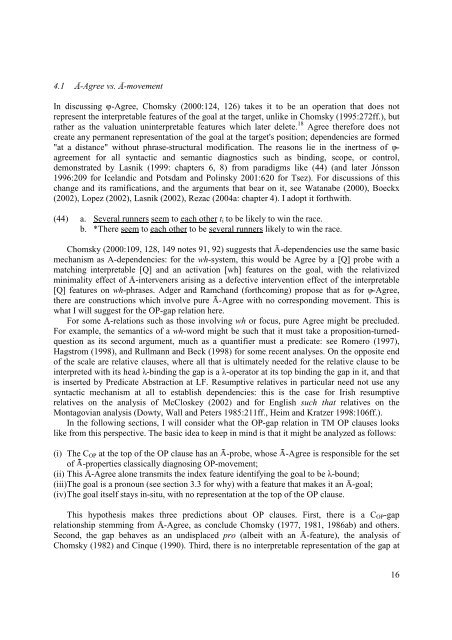1 On tough-movement* Milan Rezac, University ... - Multimania.co.uk
1 On tough-movement* Milan Rezac, University ... - Multimania.co.uk
1 On tough-movement* Milan Rezac, University ... - Multimania.co.uk
You also want an ePaper? Increase the reach of your titles
YUMPU automatically turns print PDFs into web optimized ePapers that Google loves.
4.1 Ā-Agree vs. Ā-movement<br />
In discussing φ-Agree, Chomsky (2000:124, 126) takes it to be an operation that does not<br />
represent the interpretable features of the goal at the target, unlike in Chomsky (1995:272ff.), but<br />
rather as the valuation uninterpretable features which later delete. 18 Agree therefore does not<br />
create any permanent representation of the goal at the target's position; dependencies are formed<br />
"at a distance" without phrase-structural modification. The reasons lie in the inertness of φ-<br />
agreement for all syntactic and semantic diagnostics such as binding, s<strong>co</strong>pe, or <strong>co</strong>ntrol,<br />
demonstrated by Lasnik (1999: chapters 6, 8) from paradigms like (44) (and later Jónsson<br />
1996:209 for Icelandic and Potsdam and Polinsky 2001:620 for Tsez). For discussions of this<br />
change and its ramifications, and the arguments that bear on it, see Watanabe (2000), Boeckx<br />
(2002), Lopez (2002), Lasnik (2002), <strong>Rezac</strong> (2004a: chapter 4). I adopt it forthwith.<br />
(44) a. Several runners seem to each other t i to be likely to win the race.<br />
b. *There seem to each other to be several runners likely to win the race.<br />
Chomsky (2000:109, 128, 149 notes 91, 92) suggests that Ā-dependencies use the same basic<br />
mechanism as A-dependencies: for the wh-system, this would be Agree by a [Q] probe with a<br />
matching interpretable [Q] and an activation [wh] features on the goal, with the relativized<br />
minimality effect of Ā-interveners arising as a defective intervention effect of the interpretable<br />
[Q] features on wh-phrases. Adger and Ramchand (forth<strong>co</strong>ming) propose that as for φ-Agree,<br />
there are <strong>co</strong>nstructions which involve pure Ā-Agree with no <strong>co</strong>rresponding movement. This is<br />
what I will suggest for the OP-gap relation here.<br />
For some Ā-relations such as those involving wh or focus, pure Agree might be precluded.<br />
For example, the semantics of a wh-word might be such that it must take a proposition-turnedquestion<br />
as its se<strong>co</strong>nd argument, much as a quantifier must a predicate: see Romero (1997),<br />
Hagstrom (1998), and Rullmann and Beck (1998) for some recent analyses. <strong>On</strong> the opposite end<br />
of the scale are relative clauses, where all that is ultimately needed for the relative clause to be<br />
interpreted with its head λ-binding the gap is a λ-operator at its top binding the gap in it, and that<br />
is inserted by Predicate Abstraction at LF. Resumptive relatives in particular need not use any<br />
syntactic mechanism at all to establish dependencies: this is the case for Irish resumptive<br />
relatives on the analysis of McCloskey (2002) and for English such that relatives on the<br />
Montagovian analysis (Dowty, Wall and Peters 1985:211ff., Heim and Kratzer 1998:106ff.).<br />
In the following sections, I will <strong>co</strong>nsider what the OP-gap relation in TM OP clauses looks<br />
like from this perspective. The basic idea to keep in mind is that it might be analyzed as follows:<br />
(i) The C OP at the top of the OP clause has an Ā-probe, whose Ā-Agree is responsible for the set<br />
of Ā-properties classically diagnosing OP-movement;<br />
(ii) This Ā-Agree alone transmits the index feature identifying the goal to be λ-bound;<br />
(iii)The goal is a pronoun (see section 3.3 for why) with a feature that makes it an Ā-goal;<br />
(iv) The goal itself stays in-situ, with no representation at the top of the OP clause.<br />
This hypothesis makes three predictions about OP clauses. First, there is a C OP -gap<br />
relationship stemming from Ā-Agree, as <strong>co</strong>nclude Chomsky (1977, 1981, 1986ab) and others.<br />
Se<strong>co</strong>nd, the gap behaves as an undisplaced pro (albeit with an Ā-feature), the analysis of<br />
Chomsky (1982) and Cinque (1990). Third, there is no interpretable representation of the gap at<br />
16
















